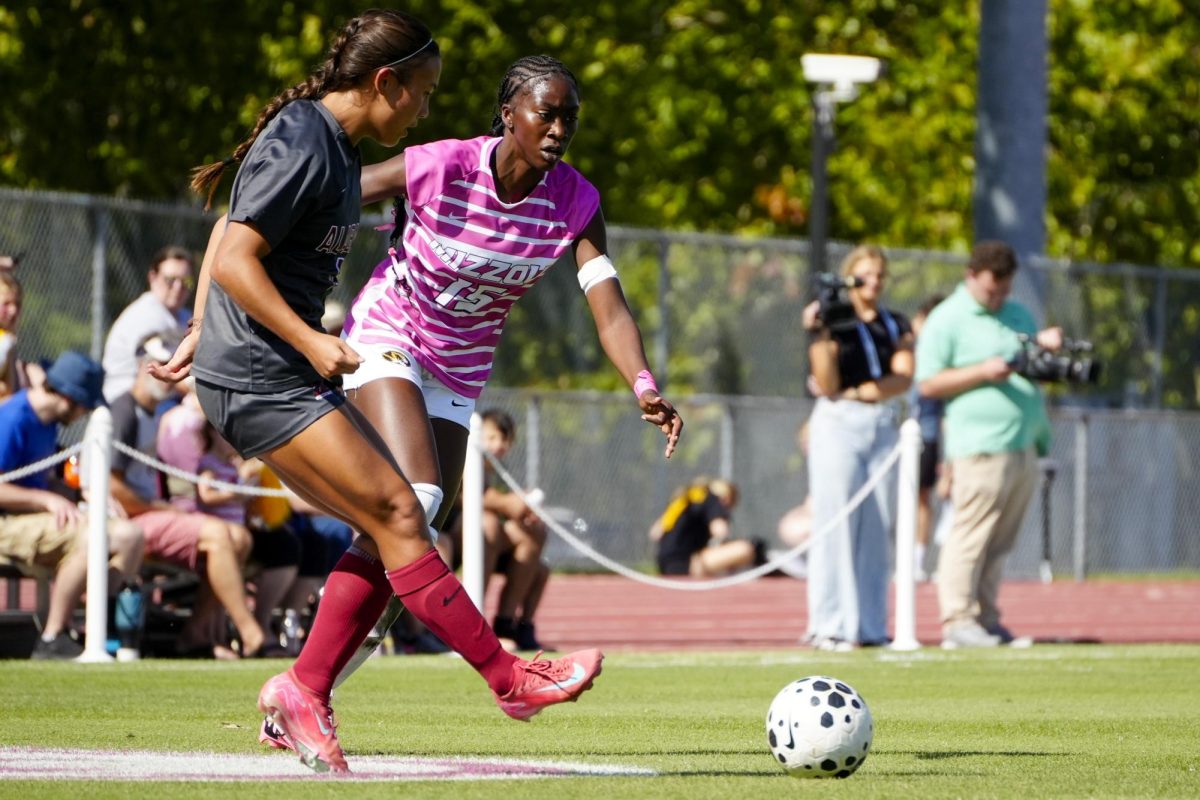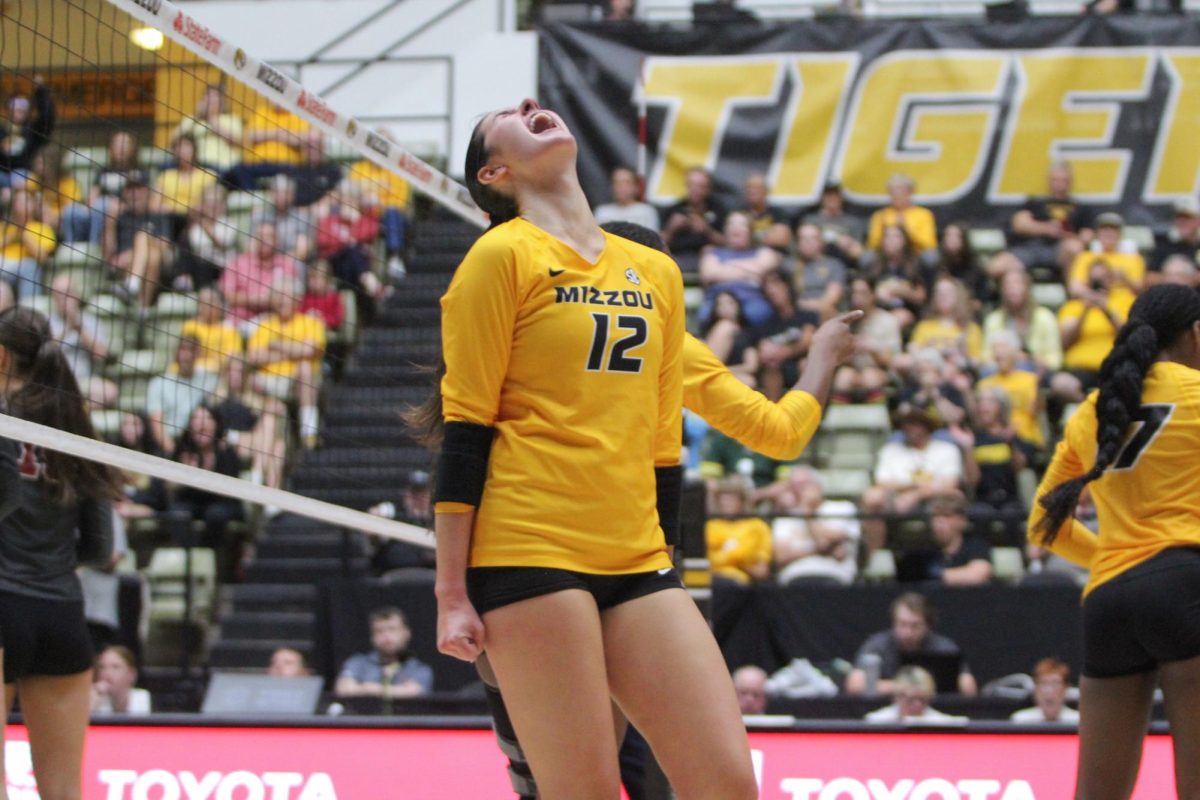Grant Leeth had overcome a nearly unprecedented onslaught of injuries over his six years as a collegiate wrestler.
He transferred to Missouri from Duke before the 2015-16 season — and missed all of it with a herniated disc in his neck. The comeback would have to wait, as meniscus problems stemming from a tear that ended his freshman year at Duke put him on the bench for the 2016-17 season as well.
When he finally did reach the Hearnes Center mat, Leeth was a force for the Tigers. He finished with a perfect 16-0 record in duals, a Mid-American Conference title, and All-American honors after placing sixth at the 2018 NCAA tournament. The then-149-pounder did it with the help of a neck brace that earned internet fame with its own Twitter account, which tweeted things like “Way to go buddy! You have my support!”
After that season, his only one without missing time due to injury, Leeth’s problems persisted. Less than one month into the 2018-19 campaign, he went down with a torn labrum and was once again out for the year.
Through all of this, Leeth never seriously considered hanging up his headgear. Not after his freshman year ended, and not after the next two seasons were nullified. Not after his shoulder gave out when the rest of his body finally allowed him to come close to his potential as a wrestler, and not even after he entered this past season as a 24-year-old redshirt junior.
When he re-injured his shoulder midway through the 2020 season, that changed.
“I got in this really bad rut, kind of in a dark place,” Leeth said. “I didn’t feel like I could get out of it, so I was just ready to hang it up.”
Leeth wasn’t competing at the level to which he’d become accustomed, and he remained in constant pain. He lost to Northern Illinois’ Anthony Gibson on Jan. 25, and as he shook hands and walked off to the bench with his eyes to the mat, he planned on never wrestling again.
“That dude had no business being on the mat with me, and I lost,” Leeth said. “I was so worried about my shoulder that I couldn’t even wrestle. I was just like, ‘I can’t do this anymore.’”
***
For a week, Leeth lost his passion for wrestling. It wasn’t long before he regained it, and decided to at least attempt to come back, while the Tigers went with Alex Butler in his place at 141 pounds.
In addition to his teammates and coaching staff, Leeth turned to a familiar face for Missouri wrestling fans during his time away from the mat: former national champion Tiger wrestler and current Fellowship of Christian Athletes Wrestling midwest director Mark Ellis, who helped him gain perspective on the situation.
“In difficult times, when things aren’t going quite like we want, a lot of times it’s the pressure we put on ourselves,” Ellis said. “There’s such a mental component to wrestling, and a lot of times we as wrestlers will kind of be defeated in our mind.”
Senior Connor Flynn, Leeth’s teammate, roommate and best friend, agreed with Ellis’ assessment.
“Grant’s one of those dudes who wants to be the first astronaut-lawyer-doctor to ever do something,” Flynn said.
Ellis could understand Leeth’s situation, as he himself was close to leaving the program his freshman year. He also tore his meniscus shortly before his 2009 national championship, an injury that made it difficult to stand up and had him rushing to get to top or bottom so that he didn’t have to wrestle on his feet.
“At that point in the season, and I’m not trying to lessen his injuries, but everybody’s banged up in wrestling,” coach Brian Smith said. “[Smith] knew the struggles that Grant was going through, and having that person to talk to was awesome for him.”
“I remember coach Smith saying, ‘Why are you talking like this, are you gonna wrestle?’” Ellis recalled, attempting a Smith impression. “I’m like, ‘Yes!’ He said, ‘Okay then we can’t even think about that. We can’t even have that conversation right now.’”
The advice got through to Leeth, who internally was starting to get the drive to compete back, and getting his love for wrestling back.
“I decided to change my mindset from being down about the injuries and about how my performance was going and started focusing on the good things,” he said. “I couldn’t swallow the fact that after everything I was gonna walk away and let it end like that.”
Mentally, Leeth had returned, but Butler remained the starter while Leeth stayed on the sideline to heal. Once he began practicing again, however, he started to reclaim the intensity and the perseverance through pain that had defined him throughout his rollercoaster of a career.
“He had to just kind of let it go and just focus on what he can control, which is the way he’s thinking and his attitude towards it, and I think that’s what he did,” Smith said. “He started coming in with a better attitude, he started practicing like a madman like we used to know him to do, and good things happened.”
“Even when he’s injured, he’s a guy that’s gonna go do mental reps,” Flynn said. “He’s a film machine when he’s hurt; that dude will watch matches from fourth grade that he’s wrestled in. It’s pretty crazy to watch.”
Despite Butler’s relative success after Leeth went out (he won three of his four matches), Smith had seen enough after the Kearney, Missouri, native recommitted himself to wrestling to have him represent the Tigers in the 141-pound weight class at the MAC championships. One problem with that — he hadn’t wrestled enough matches to qualify.
As a result, Leeth was ticketed for the Iowa State Last Chance Tournament. As the name implies, it exists for grapplers in his exact situation, and he entered the arena in Ames with his confidence intact.
“I’d been doing so much mental and emotional training that I knew I was in a good place at that point, and I just had to let the rest take care of itself,” Leeth said. “This is gonna sound so rude, or arrogant I guess, but I knew going in that I would win the tournament.”
He was absolutely right. Leeth mauled his way through the tournament, winning all three of his bouts, the first two of which were by fall. Assistant coach Tyrel Todd was at the meet, and he confirmed to Smith what on some level they both already knew: Leeth was back, and he gave them the best chance to get a wrestler to nationals.
“Coming back in January, I was doubting if I could even compete with the condition my shoulders were in,” Leeth said. “Any time you’re doubting yourself, you’re going to perform like crap.”
“I won the tournament up in Iowa State, and I started to feel myself again.”
***
Leeth returned to the MAC tournament for the first time since he was crowned conference champion in 2018, and he finished on the podium once again. He dropped the first match of the weekend by technical fall, but he responded with four consecutive victories and took third place, earning him an automatic bid for the NCAA tournament.
It was an NCAA tournament, of course, that did not happen. Five days after Leeth made it to nationals without a season-ending injury for the second time in six chances, the sports world came crashing to a halt in response to the coronavirus pandemic. The NCAA canceled all of its championships for winter and spring sports, including wrestling.
“It was hard,” said Flynn, regarding seeing his friend being stripped of the opportunity to compete at a national level so many times. “Just because he is one of those kids that is willing to go the extra mile, and he just truly has a love, love, love for the sport. So when you see something you love that much get taken away from someone so many times, it’s tough.”
Flynn’s Missouri wrestling career was ended by the tournament’s cancellation, as he, fellow senior grappler Dylan Wisman, and all other winter athletes were not granted eligibility relief by the NCAA. Instead of going back to where he was in late January, Leeth worked to stay strong for them.
“Given that other people are hurting, I didn’t have the option to get back into a rut and be a baby about it,” he said. “Everyone is going through this.”
Leeth, on the other hand, will be back, as a 25-year-old redshirt senior. He announced via Instagram on March 27 that retirement was out the window, with the caption “Run. It. Back. #7thYear.”
The decision was not difficult after all he’d fought through in 2020.
“I re-fell in love with it, and then having to take it away again was like ‘oh my God!’” but the decision to come back at that point was easy,” Leeth said. “My body’s definitely hurting and beaten up, but I know what I need to.”
_Edited by Eli Hoff | [email protected]_













